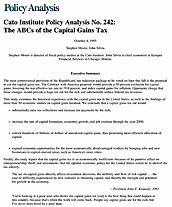The most controversial provision of the Republicans’ tax reduction package to be voted on later this fall is the proposal to cut the capital gains tax. The Contract with America proposal would provide a 50 percent exclusion for capital gains, lowering the top effective tax rate to 19.8 percent, and index capital gains for inflation. Opponents charge that those changes would provide a huge tax cut for the rich and substantially reduce federal tax revenues.
This study examines the historical experience with the capital gains tax in the United States, as well as the findings of more than 50 economic studies on capital gains taxation. We conclude that a capital gains tax cut would
- substantially raise tax collections and increase tax payments by the rich;
- increase the rate of capital formation, economic growth, and job creation through the year 2000;
- unlock hundreds of billions of dollars of unrealized capital gains, thus promoting more efficient allocation of capital;
- expand economic opportunities for the most economically disadvantaged workers by bringing jobs and new businesses to capital-starved areas, such as America’s inner cities.
Finally, the study argues that the capital gains tax is so economically inefficient–because of its punitive effect on entrepreneurship, thrift, and investment–that the optimal economic policy for the United States would be to abolish the tax entirely.
The tax on capital gains directly affects investment decisions, the mobility and flow of risk capital … the ease or difficulty experienced by new ventures in obtaining capital, and thereby the strength and potential for growth in the economy.
– President John F. Kennedy, 1963
You’re looking at a poor man who thinks the capital gains tax [cut] is the best thing that could happen to this country, because that’s when the work will come back. People say capital gains are for the rich, but I’ve never been hired by a poor man.
– New Jersey painting contractor
Over the past 10 years perhaps no single economic issue has been embroiled in more controversy than the capital gains tax. Ever since the capital gains tax rate was raised from 20 to 28 percent as part of the 1986 Tax Reform Act, Republicans and many centrist Democrats have tried repeatedly to enact a capital gains tax cut to stimulate job creation and economic growth. Those efforts have been stymied on each occasion by the criticism that the tax cut would be a “giveaway to the rich.”
This year the political logjam may finally be broken. A capital gains tax cut is a central feature of the Republican budget plan, which is now making its way through Congress. Earlier this year Speaker of the House Newt Gingrich called tax cuts the “crown jewel” of the GOP Contract with America. Yet, as the prospects for passage grow more promising, the opposition is once again mobilizing for what appears to be an eleventh-hour campaign to defeat the measure. And no one knows whether President Clinton would sign a capital gains tax cut even if Congress were to pass one.
Despite the high profile of this tax issue in Washington, many Americans still have little awareness of why the tax treatment of capital gains should matter to them. This study is an attempt to make the capital gains tax understandable and relevant to ordinary American workers. We intend to walk the reader through the ABCs of the capital gains tax. Here are some of the questions this study addresses:
- What is capital?
- What is a capital gain?
- Why is the capital gains tax important to the U.S. economy?
- How does the capital gains tax affect the typical American worker?
- Who pays the capital gains tax? Is it a rich man’s tax?
- Would a capital gains tax cut increase the budget deficit?
- How does the U.S. capital gains tax compare with those of other nations?
- How would a capital gains tax cut affect jobs and wages?
To answer those questions, this guide synthesizes all of the most recent and well-respected studies of the issue and presents the arguments for and against the proposed tax cut. It is our conclusion from reviewing the historical evidence and more than 50 studies that the GOP tax reduction plan (which would lower the tax rate from 28 to 19.6 percent and index gains for inflation) would
- increase taxes collected from the rich;
- increase the rates of capital formation, economic growth, job creation, and real wages over the next decade; and
- unlock hundreds of billions of dollars of unrealized capital gains, thus promoting a more efficient capital market.
An even more economically compelling reform would be to eliminate the capital gains tax entirely. Abolishing the capital gains tax would promote entrepreneurship, business creation, U.S. competitiveness, and higher wages for American workers–especially for the most economically disadvantaged among us.
About the Authors

This work is licensed under a Creative Commons Attribution-NonCommercial-ShareAlike 4.0 International License.
